
In early March the Brighton and Hove Food Partnership (BHFP) convened a face to face meeting of the city’s Emergency Food Network, usually held quarterly. The timing of this meeting was fortuitous happening just prior to the 23rd March COVID-19 lock down. The invite list was expanded to include many of the local organisations with a potential role in addressing the expected food challenges associated with the lock-down – a ‘crisis meeting’ related to food provision.
This timely convening of key organisations provided a strong foundation for the collaborative work on emergency food provision that has happened since. Having a food partnership and track record on cross sector working around food meant that the city was able to respond quickly. Different business and voluntary sector organisations, statutory bodies and community groups were confident about working together with BHFP acting as the central co-ordinating organisation for the response.
BHFP’s initial focus was on working with existing members of the Surplus Food Network co-ordinating the collection and re-distribution of surplus food from closing restaurants, cafés and bars bringing the food to a central hub and then sending it out to neighbourhoods city-wide.
2 things became clear immediately:
“Food Banks were never the answer – and it was really quickly clear they wouldn’t be the answer in this crisis” Emily O’Brien, BHFP
Immediately following the ‘crisis meeting’ BHFP launched a crowd-funding appeal for £15,000 to buy emergency food in bulk from catering wholesalers in the city. The target was quickly reached and doubled to £30,000. When that target was reached the City Council provided match-funding of £30,000 to support the effort to purchase emergency food.
The Council also provided grant funding to BHFP to manage and co-ordinate the emergency food distribution and helped to secure a local secondary school as the premises for the food processing hub.
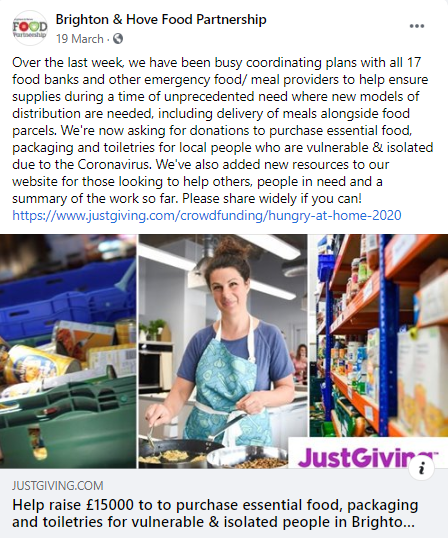
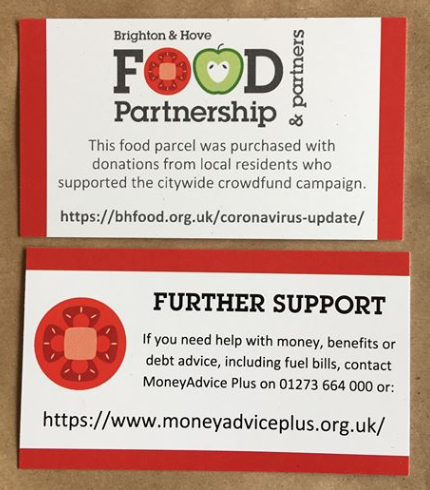
BHFP now co-ordinates the central food processing hub where purchased and donated food is collected and packaged into individual food parcels or food for meal preparation.
In the week of 27th April 2020 40 projects gave out emergency food parcels to 3001 households, supporting over 4831 people (including at least 996 children) and served 3966 meals. In the week of 30th March 2020 this was 1400 parcels and 1800 meals. As a comparison, prior to the Covid-19 crisis, emergency food providers were giving out 420 parcels a week.
It also purchases food for food banks that were in operation prior to the crisis as all have reported increased demand / challenges of food supply. This work includes sourcing food from local farms and businesses as well as wholesale supplies.
It then organises and co-ordinates distribution to new neighbourhood food hubs around the city providing food parcels and cooked meals to vulnerable families and individuals.
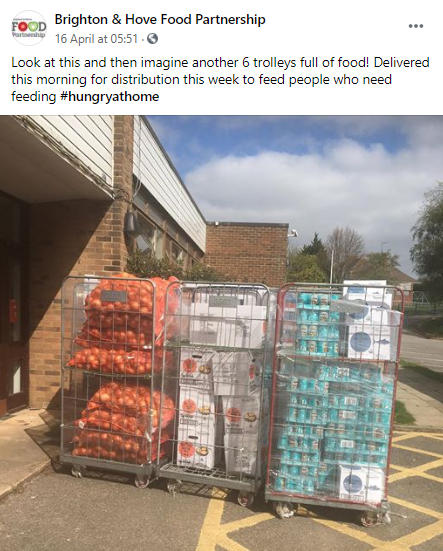
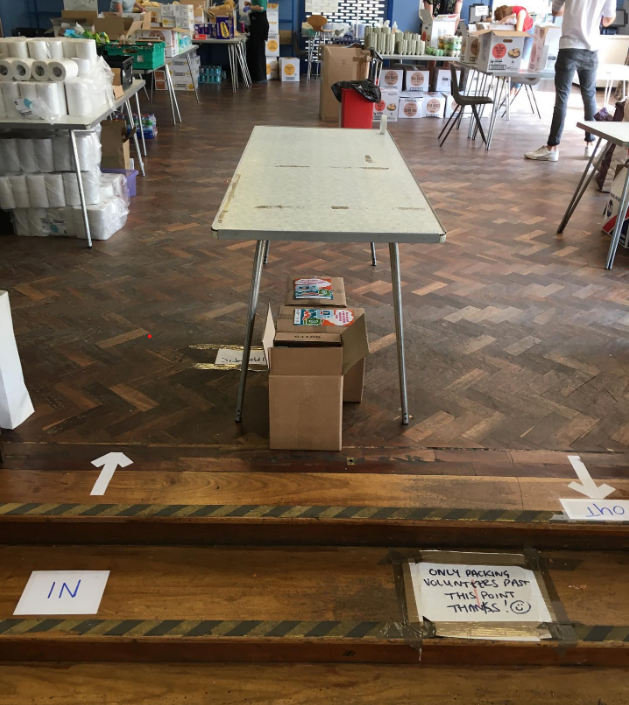
“…it’s been an incredibly fast moving and connected response, led by Vic Borrill and her team at Brighton and Hove Food Partnership. I dread to think how many hours the remarkable Vic has clocked up in the last three or four weeks but I’ve yet to encounter her with anything but a positive attitude.” - Iain Chambers, Director of Brighton Food Factory
Since the initial co-ordination meeting in early March the BHFP has taken a central role in supporting the City Council’s food-related response to the crisis.
“We put ourselves at the centre to join up the dots” - Emily O’Brien, BHFP – SFP webinar, 15.4.2020 SFP webinar recordings
Brighton & Hove City Council has used a ‘cell’ structure to co-ordinate action, this involves cross department working on key themes. The Food Partnership jointly leads the food cell with a senior member of the city council. The food cell holds a weekly conference call taking an action-based approach bringing together people from Childrens Service, School Meals, Older people’s services, environmental health, public health, communications and more.
“Working with BHCC via the food cell has been an extremely positive experience. Food safety advice for food banks, venues for food hubs, sourcing cleaning materials, specialist support for homeless people, updates on supermarket opening times, help for alcohol dependent people, hot meal provision for older people living alone, information about the free school meal provision, ways of accessing money for self-isolating people, management of referrals and access to local discretionary grant funds – we raise a vast range of issues via this forum and Council staff have worked quickly and effectively to respond” - Vic Borrill – Director BHFP
The city’s food-related response has three strands:
BHFP have also been involved in helping the Council set up their Community Hub help-line – a central service to help navigate, map and untangle who is doing what and who can provide necessary support – a system of triage to prioritise provision and avoid duplication.
“We’re supporting the council to do that navigation and improve signposting who’s supporting whom” - Emily O’Brien, BHFP
The BHFP and collaborating partners are not just taking a short-term view of the immediate crisis.
“Whilst I am so proud of the way the city has stepped up and responded to a 4-fold increase in need for emergency food we are really aware that this crisis response needs to be a short term solution. We have been working with national organisations to emphasise the message that people need money not emergency food parcels. BHFP has been providing information to the Food Foundation, DEFRA and Sustain to help those formulating national policy to have some on the ground examples.
Looking ahead BHFP is also working to look at ‘what next’ in terms of supporting people with access to food in the coming weeks and months. Throughout this we have been clear we do not want to create dependence on emergency food, we want to ensure that food is provided with dignity and choice, we want to support our local economy and supply chains and we look forward to the day when across the city people can sit together around tables in shared meal settings and eat together.”
Vic Borrill – Director BHFP
Collaborating organisations involved in the emergency food provision effort include:
The COVID-19 response has had a significant impact on the BHFP team.
“We have had to close (our) community kitchen and suspend our community gardening. (Our response) affects our overall staffing (staff on furlough). We have had to ask funders to let us ‘repurpose’ funding to respond to the emergency although we have also had additional funding as they have asked us to lead the community/council response. Like others we have had to adapt to home working and find new ways of meeting – for example our emergency food network have met by zoom.” - Emily O’Brien
The BHFP provides a source of clear, easily accessible, up-to-date information through the BHFP website and particularly the BHFP Coronavirus update
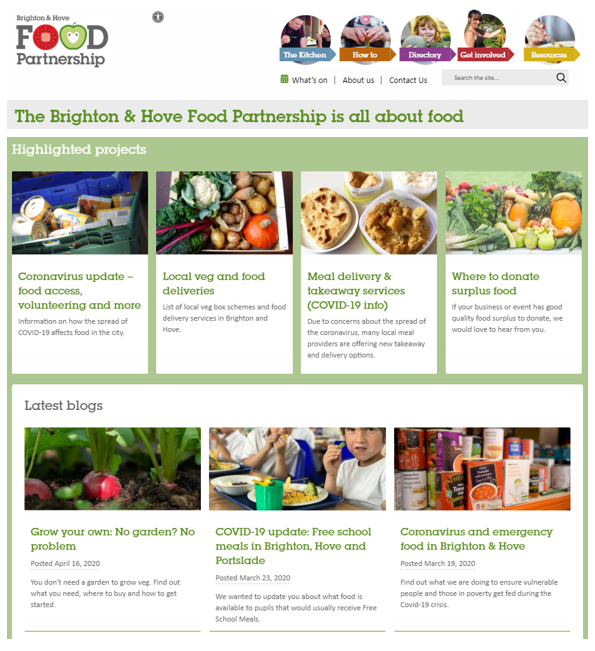
Information includes:
The organisations collaborating in Brighton and Hove’s response to COVID-19 – including BHFP – have recognised the importance of strong existing relationships in the food sector, the need for generous leadership and a high level of trust.
The recognition of BHFP’s role in bringing this response together highlights the value of cross-sectoral food partnerships in rising to the challenge of an emergency such as COVID-19.
“Communities have moved much faster than the government, councils, big charities and funders, corporations and philanthropists. Without even so much as a handshake … people who already trusted each other because of their existing connections, agreed to move with safety, purpose, determination and speed to get help and reassurance that same day to those that needed it most.”
“Most of the participants in (the) core group of organisations were already connected in some way, part of the city’s food and community ecosystem. We trust each other and I like to think that this trust will have deepened in these turbulent few weeks.” - Iain Chambers, Director of Brighton Food Factory in his blog: Make do - Travelling at the speed of trust